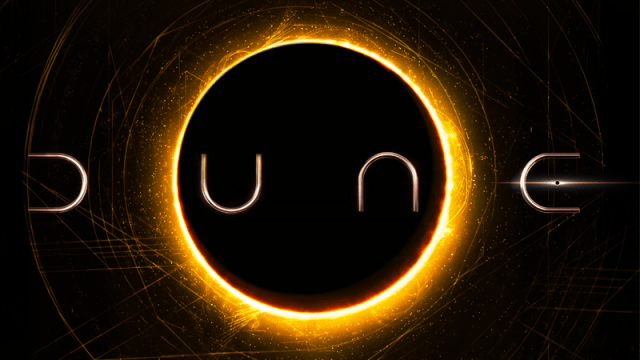Get ready to meet your (spice) maker. Vanity Fair has shared a look inside Denis Villeneuve’s highly anticipated take on the classic sci-fi saga Dune, which he called “the most difficult thing I’ve done in my life.”
A new series of images from Vanity Fair’s report from Dune’s set take us deeper inside the world of Villeneuve’s adaptation of the first half of Frank Herbert’s novel. The movie stars Timothée Chalamet as Paul Atreides, a young noble of House Atreides who moves to the desert planet Arrakis with his father Duke Leto (Oscar Isaac) and his mother Lady Jessica (Rebecca Ferguson), a “warrior priestess” of the Bene Gesserit order.
[referenced url=” thumb=” title=” excerpt=”]
Lady Jessica is one of several female roles that have been expanded for the film adaptation. The female characters of Herbert’s novels were (in some ways) ahead of their time, but still fell prey to tired tropes, a criticism that likewise applies to the story’s approach to race. Dune is a commentary on the white saviour complex, but in examining that complex, still ends up playing to the same stereotypes it tries to dismantle. Half a century later, the cracks definitely show—something Villeneuve’s take hopes to address, according to Ferguson, who says that Villeneuve strived to bring several of the characters’ arcs “up to a new level.”
Most notably shown in these new images is that this tweaking meant race and gender-swapping one of the key characters: Dr. Liet Kynes, the lead ecologist on Arrakis and, in the novel at least, the father of Chani (Zendaya). The character was written as a white man who’d been accepted into Fremen society (in what can only be described as a Dances With Wolves situation), but is now played by Rogue One: A Star Wars Story’s Sharon Duncan-Brewster.
#DUNE FIRST LOOK: Sharon Duncan-Brewster portrays ecologist Dr. Liet Kynes, a role previously depicted by a white man:
“[She] keeps peace amongst many people. Women are very good at that, so why can’t Kynes be a woman? Why shouldn’t Kynes be a woman?” @MissEssDeeBee says. pic.twitter.com/KFhXDJCE4d
— VANITY FAIR (@VanityFair) April 14, 2020
“What Denis had stated to me was there was a lack of female characters in his cast, and he had always been very feminist, pro-women, and wanted to write the role for a woman,” Duncan-Brewster told Vanity Fair. “This human being manages to basically keep the peace amongst many people. Women are very good at that, so why can’t Kynes be a woman? Why shouldn’t Kynes be a woman?”
In Dune, Paul Atreides and his family have moved to Arrakis to supervise the spice trade, as the planet is the source of a powerful spice called melange that holds the key to interstellar travel. House Atreides also has to contend with the planet’s former caregivers, House Harkonnen—led by Duke Leto’s sworn enemy Baron Harkonnen (Stellan Skarsgård), who yearns to get his planet back. According to Villeneuve, Skarsgård was fitted with full-body prosthetics to replicate the baron’s larger form, but he wanted to make sure the character was grounded in his menace instead of borderline ridiculous.
“As much as I deeply love the book, I felt that the baron was flirting very often with caricature,” Villeneuve said. “I tried to bring him a bit more dimension. That’s why I brought in Stellan. Stellan has something in the eyes. You feel that there’s someone thinking, thinking, thinking—that has tension and is calculating inside, deep in the eyes. I can testify, it can be quite frightening.”
#DUNE FIRST LOOK: Oscar Isaac is Duke Leto, father of Paul and head of House Atreides.
See more from @Breznican‘s film preview: https://t.co/ubFGRO3FWu pic.twitter.com/X6nNB4YAYC
— VANITY FAIR (@VanityFair) April 14, 2020
No images have been shared yet of the Baron’s look yet, but Vanity Fair shared several other photos from the set, which you can head on over to the site to see. Dune also stars Josh Brolin and Jason Momoa as Gurney Halleck and Duncan Idaho, two of Paul’s teachers and mentors who help him grow his abilities. Among the Fremen, Chani and the others are guided by tribe leader Stilgar (Javier Bardem).
According to Villeneuve, this adaptation was especially challenging because Dune is so vast, covering “politics, religion, ecology, spirituality” while hosting an overwhelming cast of characters. It’s partially why he decided to split the first book into two movies, rather than handle it all at once. That does mean we may (temporarily) miss out on some of the story’s biggest moments, like the arrival of Baron Harkonnen’s nephew and heir, Feyd-Rautha (whose casting still hasn’t been announced yet). But it will give us more time with the beautiful and destructive world Villeneuve has brought to life—one he feels is more prescient than ever, with his adaptation covering themes of climate change.
“No matter what you believe, Earth is changing, and we will have to adapt,” he said. “That’s why I think that Dune, this book, was written in the 20th century. It was a distant portrait of the reality of the oil and the capitalism and the exploitation—the overexploitation—of Earth. Today, things are just worse. It’s a coming-of-age story, but also a call for action for the youth.”
Dune arrives in Australian theatres on December 26. For more information, you can check out Vanity Fair’s profile here.
